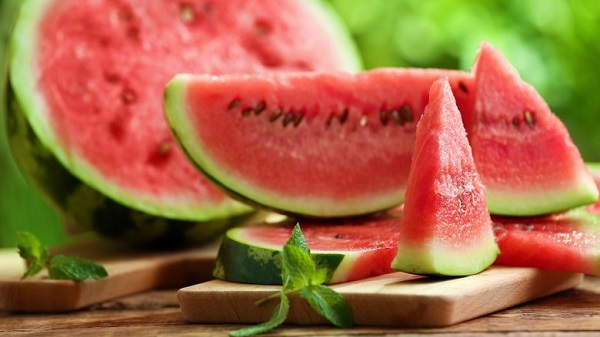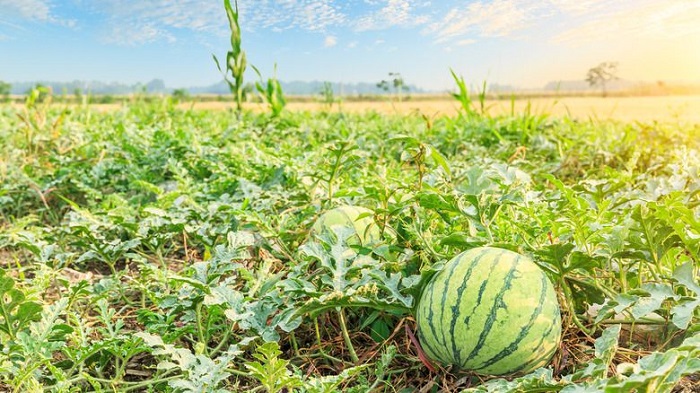


Watermelon is a refreshing and tasty fruit that can be eaten in many ways. But is it good for you? What does eating watermelons do for your body and health? Since some fruits have so much sugar, it makes you wonder if you even should be eating them, especially if you’re a health-conscious person. But does watermelon count as one such fruit? Let’s look at some watermelon facts before you eat another one.
There is a lively debate about whether watermelon is a fruit or vegetable. Botanically speaking, watermelon is a fruit in the same way that a tomato is a fruit: the seeds grow in the ovary of the flowering plant instead of the roots or leaves. From scientific watermelon facts- it is a member of the Cucurbitaceae family, which is made up of plants that make gourd vegetables like cucumbers and pumpkins.

Img Src: thesoundbiterestaurant.com
Most people only eat the red part of the watermelon and throw away the rest. But it turns out that the whole fruit is healthy. According to reports from Live Science, you can eat every part of a watermelon, even the rind. The white flesh near the peel has more citrulline, an amino acid that isn’t essential but is becoming more popular in health and wellness circles. This nutrient helps blood flow and makes the heart healthier. Now you can talk about these watermelon facts and spread the knowledge.
Img Src: unian.net
There are a lot of different types of watermelons, and not all of them have red flesh. Several don’t have the antioxidant lycopene, which is what makes watermelon red. They are instead full of beta-carotene, which gives them a bright yellow or slightly orange color. Unfortunately, you can’t tell from the outside because almost all watermelons have green rinds with stripes.
Img Src: nastroy.net
The fact that watermelon is mostly water (92%) makes it a great alternative to plain water, and it’s not as acidic as many citrus-flavored sports drinks. Drinking watermelon juice won’t give you acid reflux or hurt your stomach in other ways, which is why it could be an excellent post-workout drink. It has B vitamins to provide you with more energy and potassium and other electrolytes to replace the nutrients you lose when you sweat.
Img Src: nastroy.net
Citrulline, a rare type of amino acid found in watermelon, is a great way to treat sore muscles. Studies have shown that athletes whose heart rates recover faster and whose muscles don’t hurt as much the next day drink watermelon juice before hard workouts. Watermelon juice may also help you do better in sports as a whole.
Img Src: island.lk
When you were a child, you probably heard the old wives’ tale that huge fruits would grow in your stomach if you ate watermelon seeds by accident. This is not true, and the seeds are also entirely edible. The International Journal of Nutrition and Food Sciences found that eating watermelon seeds is good for your health in many ways. They are high in fiber and protein and have a lot of antioxidants, a lot of vitamin B, and a number of minerals, including magnesium, zinc, and potassium.
You can’t eat them right away. They have to be sprouted and shelled first, and this increases their nutrient content. Just soak the seeds in water at room temperature for 12 hours, then pour out the water. Rinse them every 12 hours for three to four days until sprouts appear. You can add sprouted seeds to your granola for breakfast, top your favorite grain bowl or soup with them, or eat them as a snack. You could also skip the hard work of sprouting and roast them instead for a quick and healthy snack.
Img Src: thesoundbiterestaurant.com
Not only do ripe watermelons taste better, but they also have more nutrients. The Journal of Food Composition and Analysis looked at how white, white-pink, pink, and red-ripe watermelons tasted. They found that the unripe fruit had almost no beta carotene and fewer nutrients overall. In contrast, the riper fruit had more antioxidants and vitamin C.
Img Src: thesoundbiterestaurant.com
The diet plan is to only eat watermelon for breakfast, lunch, and dinner to get rid of toxins in your body. Stick to this diet for five days (maybe add some other foods back after the third day) and watch your weight decrease quickly. Since each slice of watermelon only has 86 calories, you’d have to eat a whole watermelon or more every day to get the 1,200 calories that women need to stay healthy (or 1,500 calories for men).
Img Src: alo.rs
When you eat watermelon, you get a boost of citrulline into your bloodstream. This makes blood vessels relax, just like an erectile dysfunction medication. Studies have also shown that citrulline can increase your libido. There doesn’t seem to be a hard-and-fast rule about how much to eat to get these benefits, but LiveScience says it’s probably a lot.
Img Src: thesoundbiterestaurant.com
Watermelon is good for your body in general. It’s low in calories and fat, full of vitamins and minerals, and has a lot of water, which makes it very refreshing on hot days. This fruit is one of the best sources of a phytonutrient called lycopene. Lycopene is an antioxidant that gives the fruit’s flesh its red color. These antioxidants may help prevent some types of cancer and keep your heart healthy. However, if you consume too much lycopene, you may have stomach problems. More than 30 mg daily can cause nausea, diarrhea, bloating, and stomach pain. But you can eat up to four cups of watermelon before you reach this point, which is good news.
Suppose you have hyperkalemia, which means you have too much potassium in your blood. In that case, you might also want to limit how much watermelon you eat daily. Bet you never knew these watermelon facts!
Img Src: thesoundbiterestaurant.com